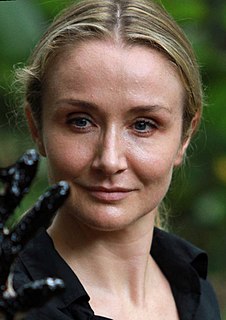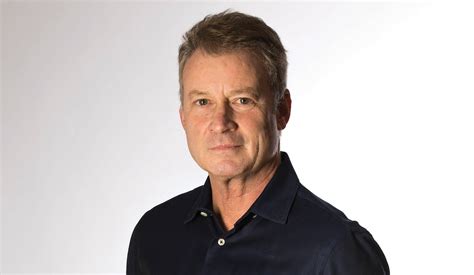A Quote by Kofi Annan
Fierce national competition over water resources has prompted fears that water issues contain the seeds of violent conflict.
Related Quotes
It's common to say that trees come from seeds. But how can a tiny seed create a huge tree? Seeds do not contain the resources need to grow a tree. These must come from the medium or environment within which the tree grows. But the seed does provide something that is crucial : a place where the whole of the tree starts to form. As resources such as water and nutrients are drawn in, the seed organizes the process that generates growth. In a sense, the seed is a gateway through which the future possibility of the living tree emerges.
When resources are degraded, we start competing for them, whether it is at the local level in Kenya, where we had tribal clashes over land and water, or at the global level, where we are fighting over water, oil, and minerals. So one way to promote peace is to promote sustainable management and equitable distribution of resources.
Water, like many other resources is harvested, transported and used throughout all aspects of society. Unlike other resources, water is critical to the survival of all forms of life. The underlying question that sits at the core of my exploration is to what degree can we shape water before it begins to shape us.
Water, like many other resources, is harvested, transported and used throughout all aspects of society. Unlike other resources, water is critical to the survival of all forms of life. The underlying question that sits at the core of my exploration is to what degree can we shape water before it begins to shape us.
I believe water will be the defining crisis of our century — from droughts, storms, and floods to degrading water quality. We'll see major conflicts over water and the proliferation of water refugees. We inhabit a water planet, and unless we protect, manage, and restore that resource, the future will be a very different place from the one we imagine today.
Here in the Great Lakes region, a fourth year in a row of declining water levels has caused millions of dollars in losses for shipping companies, marinas and other businesses and prompted further restrictions on future water withdrawals for expanding suburbs. "A lot of people just can't believe that we may be running out of water, living this close to the Great Lakes," said Sarah Nerenberg, a water engineer with the Northeastern Illinois Planning Commission, which conducted the study on shortages.
Water does not resist. Water flows. When you plunge your hand into it, all you feel is a caress. Water is not a solid wall, it will not stop you. But water always goes where it wants to go, and nothing in the end can stand against it. Water is patient. Dripping water wears away a stone. Remember that, my child. Remember you are half water. If you can't go through an obstacle, go around it. Water does.
Water is one of the most basic of all needs - we cannot live for more than a few days without it. And yet, most people take water for granted. We waste water needlessly and don't realize that clean water is a very limited resource. More than 1 billion people around the world have no access to safe, clean drinking water, and over 2.5 billion do not have adequate sanitation service. Over 2 million people die each year because of unsafe water - and most of them are children!










































